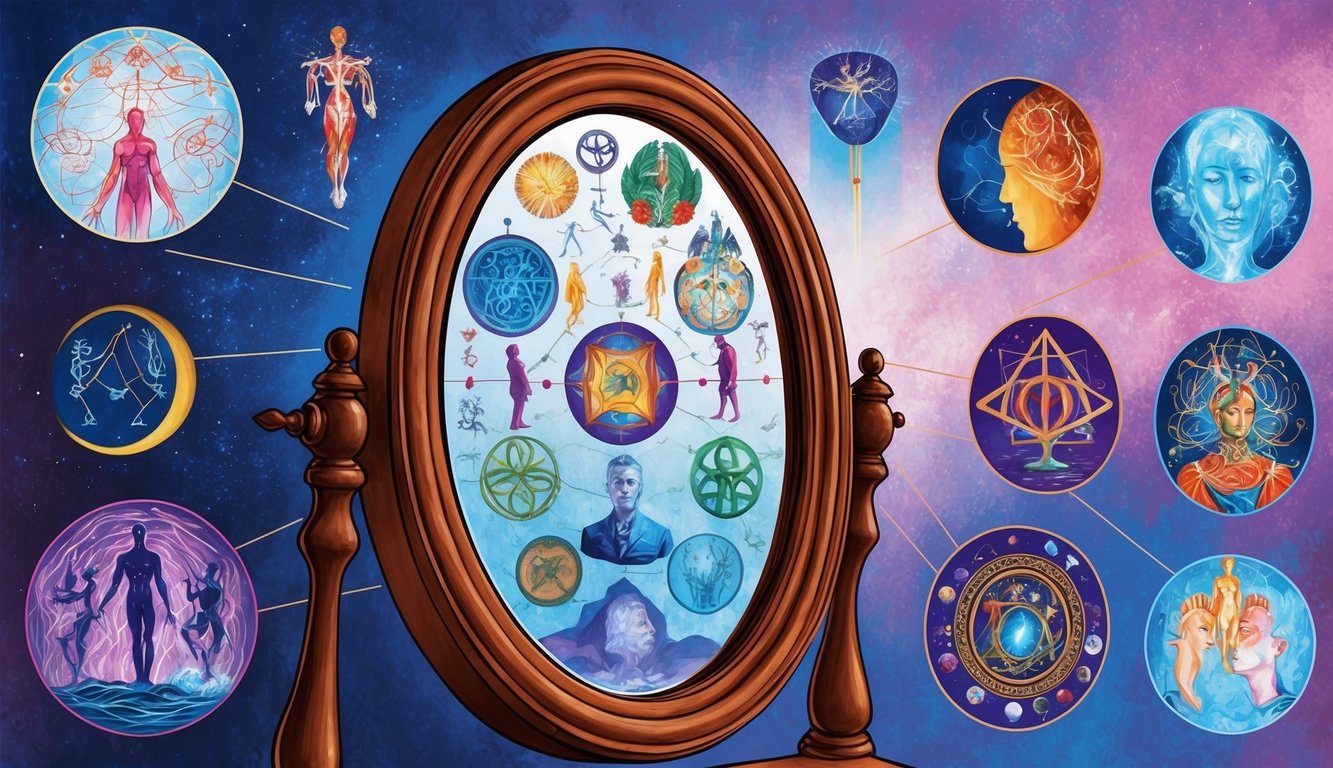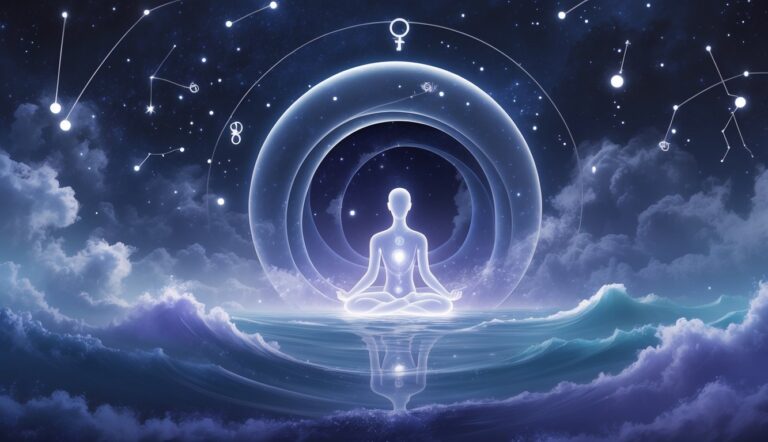Align Your Life with Your True North
The Power Quadrant System decodes your natural talents and pinpoints the career, timing and relationships that let you earn more, love deeper, and wake up eager for the day.
- Uncover your #1 high-income strength
- Draw in partners who raise your energy
- Work when your body’s clock is in “flow”
For centuries, humans have been fascinated by dreams.
They offer glimpses into our subconscious minds and spark curiosity about their hidden meanings. Understanding dream symbolism can provide valuable insights into your thoughts, emotions, and experiences.
As you explore the world of dream interpretation, you’ll discover a rich tapestry of symbols and themes that reflect your inner landscape.
Deciphering dream meanings isn’t an exact science, but it can be a powerful tool for self-reflection and personal growth.
Your dreams often incorporate elements from your daily life, blending them with your deepest fears, desires, and memories.
By paying attention to recurring symbols or themes in your dreams, you can gain a deeper understanding of your subconscious mind and the issues that may be affecting you on a deeper level.
Key Takeaways
- Dream interpretation can offer valuable insights into your subconscious mind
- Recurring symbols in dreams may reflect important aspects of your waking life
- Exploring dream meanings can lead to increased self-awareness and personal growth
Exploring Dream Interpretation
Dreams have fascinated humans for millennia.
You might wonder what your nightly visions mean and how to unravel their mysteries.
Let’s dive into some key aspects of dream interpretation.
The Role of AI in Understanding Dreams
AI is revolutionizing dream analysis.
You can now use apps that record your sleep patterns and dream content.
Decode Your Personal Success Blueprint
Power Quadrant System shows you the exact career, relationships, and daily rhythm that match your natural DNA—so you earn more, work happier, and connect deeper.
- Pinpoint your #1 money-making talent
- Erase conflict & attract ideal partners
- Multiply productivity with perfect timing
These tools use machine learning to spot recurring themes and symbols in your dreams.
Some AI systems even attempt to generate interpretations based on vast databases of dream symbolism.
Advanced algorithms can identify emotional patterns in your dream reports.
This helps you gain insights into your subconscious mind.
AI dream analysis isn’t perfect, but it offers a fresh perspective on your nighttime narratives.
Dream Dictionary: A Tool for Decoding
Dream dictionaries have been around for centuries.
You’ll find them useful for quick symbol lookups.
Many online versions offer extensive databases of common dream elements.
Remember, these interpretations aren’t one-size-fits-all.
Tap Into Your Built-In Success GPS
The Power Quadrant System deciphers your genetic blueprint so you can lock onto the career, income and relationships that feel effortless—and wildly rewarding.
- Zero in on your natural high-earning genius
- Sync with partners who boost your vibe
- Wake up driven, finish days fulfilled
Your personal experiences shape your dream symbols.
A snake might represent fear for one person but wisdom for another.
Use dream dictionaries as a starting point.
Reflect on how the suggested meanings relate to your life.
This personal touch makes dream interpretation more meaningful and accurate.
Historical Perspectives: Freud and Jung on Dreams
Sigmund Freud viewed dreams as windows into the unconscious mind.
He believed they revealed repressed desires and unresolved conflicts.
You might recognize his concept of dream symbolism, where objects represent hidden meanings.
Carl Jung expanded on Freud’s ideas.
He introduced the concept of archetypes – universal symbols shared across cultures.
Jung saw dreams as messages from the unconscious, guiding personal growth.
Both theorists emphasized the importance of free association in dream analysis.
You’re encouraged to explore the emotions and memories your dreams evoke.
This process can lead to profound self-discovery and psychological insights.
Deciphering Dream Symbols
Dreams often speak to us through a rich tapestry of symbols.
Understanding these can unlock deeper insights into your subconscious mind and emotional state.
Natural Elements and Their Meanings
Water in dreams often reflects your emotional landscape.
Calm waters may indicate inner peace, while turbulent seas could suggest emotional turmoil.
Fire can represent passion or transformation in your life.
Mountains might symbolize obstacles you’re facing or goals you’re striving to achieve.
Clouds in your dreams can have various meanings.
Dark, stormy clouds might point to worries or negative emotions you’re experiencing.
Fluffy, white clouds could signify a sense of freedom or new opportunities on the horizon.
Dreams of earth or soil might relate to your foundation or stability in life.
Wind could represent change or the need for fresh perspectives in your waking life.
Objects and Artifacts as Dream Symbols
Cars in dreams often symbolize your journey through life or a specific situation.
The condition of the car can provide clues about how you feel about your progress.
A castle might represent security, power, or aspirations you hold.
Cages in dreams can indicate feelings of confinement or restriction in your waking life.
Consider what or who is in the cage and how you interact with it.
Candles might symbolize hope, enlightenment, or the need for clarity in a situation.
Caps or hats in dreams could represent the different roles you play in life or how you present yourself to others.
Canoes might suggest a need for guidance or navigating emotional waters.
Animals in Dreams and Their Significance
Animals often appear in dreams as powerful symbols.
Cats, for example, might represent independence, mystery, or feminine energy.
Pay attention to the cat’s behavior and your feelings towards it in the dream.
Dogs frequently symbolize loyalty and companionship.
If you dream of a specific breed, consider its characteristics and how they might relate to your life.
Birds can symbolize freedom, aspirations, or messages from your subconscious.
Snakes in dreams are complex symbols.
They might represent wisdom, transformation, or hidden threats.
The snake’s behavior and your reaction to it in the dream can offer valuable insights.
Fish swimming in clear water might indicate spiritual or emotional growth.
Insects could symbolize minor annoyances or persistent worries in your waking life.
Common Themes in Dreams
Dreams often feature recurring patterns and symbols that reflect our subconscious thoughts and emotions.
Understanding these themes can provide insights into our waking lives and inner psyche.
Navigating Through Common Dreams
You might find yourself falling, flying, or being chased in your dreams.
These are some of the most frequent dream scenarios.
Falling dreams can signal feelings of insecurity or loss of control in your life.
Flying dreams often represent freedom or a desire to escape.
Chase dreams may indicate you’re avoiding a person or situation in your waking life.
Another common theme is teeth falling out, which can symbolize concerns about your appearance or aging.
Dreams of being unprepared for an exam or important event might reflect your anxiety about real-life challenges.
Interpreting Nightmares and Anxiety-Induced Visions
Nightmares can be particularly distressing, but they often serve a purpose.
They may help you process difficult emotions or prepare for potential threats.
Common nightmare themes include being attacked, trapped, or losing loved ones.
Anxiety-induced dreams might feature scenarios where you’re embarrassed in public or unable to find a bathroom.
These often reflect your real-world worries and insecurities.
Dreams about being cheated on by a partner can stem from trust issues or fear of abandonment.
If you’re dreaming about your children being in danger, it might indicate protective instincts or concerns about their well-being.
Remember, dream interpretation is subjective.
Your personal experiences and emotions play a crucial role in deciphering your dreams’ meanings.
Personal Elements in Dreams
Dreams often reflect aspects of our inner selves, relationships, and daily experiences.
They can provide insights into your identity, emotions, and interpersonal dynamics.
Dreams About Self and Identity
You might find yourself wearing different clothes or appearing as a different version of yourself in dreams.
These scenarios can represent shifts in your self-perception or desired changes in your life.
If you dream of facing a challenge, it may signify personal growth or obstacles you’re working to overcome.
Dreams where you’re naked or can’t find your clothes could indicate feelings of vulnerability or exposure in your waking life.
Pay attention to how you feel in these dreams – are you embarrassed or confident? Your emotional reaction provides clues about your self-image.
Sometimes, you may dream of being someone else entirely.
This can reflect aspects of yourself you’d like to develop or parts of your personality you haven’t fully embraced yet.
Interpersonal Relationships and Encounters
Dreams featuring loved ones, colleagues, or even strangers can illuminate your social dynamics and emotional connections.
If you dream of being cheated on by a partner, it might not be a literal prediction but could signify insecurity or trust issues in your relationship.
Encounters with people from your past in dreams may highlight unresolved feelings or situations you need to address.
These dreams can serve as prompts for self-reflection and personal growth.
Your interactions in dreams can reveal how you perceive others and yourself in social contexts.
Do you feel confident or anxious? Are you leading or following? These dream scenarios offer valuable insights into your interpersonal dynamics and social behaviors.
The Dream-Reality Connection
Dreams and waking life intertwine in fascinating ways.
Your nocturnal visions can spark creativity, help solve problems, and reflect your daily experiences.
From Dreaming to Doing: Creativity and Problem-Solving
Have you ever woken up with a brilliant idea? Dreams can be a wellspring of creativity.
Your sleeping mind often makes unexpected connections, leading to innovative solutions.
Many artists and inventors credit dreams for their breakthroughs.
Salvador Dali used dream imagery in his surrealist paintings.
Paul McCartney famously dreamt the melody for “Yesterday.”
Dreams can also help you tackle real-world challenges.
As you sleep, your brain processes information from the day.
This can lead to “aha” moments when you wake up.
Try thinking about a problem before bed – you might dream up an answer!
The Reflection of Daily Life in Dreams
Your dreams often mirror your waking experiences.
Stressed about a work presentation? You might dream of being unprepared for an exam.
Just started a new relationship? Romantic dreams may become more frequent.
Dreams can highlight emotions you’re not fully processing during the day.
If you’re avoiding a difficult conversation, it might show up in your dreams as conflict or chase scenarios.
Pay attention to recurring dream themes.
They may point to unresolved issues or desires in your life.
For example, dreams of flying could indicate a wish for freedom or escape from daily pressures.
Dynamics of Dreaming
Dreams unfold through a complex interplay of mental processes and external influences.
Your nightly adventures follow distinct patterns while also being shaped by your daily experiences and environment.
The Structure and Phases of Dreams
As you sleep, your dreams typically occur during the rapid eye movement (REM) stage.
This phase is characterized by increased brain activity and vivid imagery.
Your dreams often follow a narrative structure, with a beginning, middle, and end.
Early in the night, dreams tend to be shorter and more fragmented.
As you progress through sleep cycles, they become longer and more intricate.
You might experience multiple dreams in a single night, though you may only remember snippets upon waking.
Dream content can range from mundane to fantastical.
You might find yourself in familiar settings or completely alien landscapes.
The Impact of External Factors on Dream Content
Your dreams are significantly influenced by your daily experiences.
Recent events, concerns, and emotions often make their way into your nighttime narratives.
If you’ve been camping recently, you might dream of outdoor adventures or encounters with wildlife.
Similarly, if you’ve been feeling stressed or anxious, your dreams may reflect these emotions in symbolic ways.
You might even dream about escaping danger, such as being chased or lost in an unfamiliar place.
These dreams can serve as a way for your mind to process fears and challenges from your waking life.
External stimuli can also affect your dreams.
A ticking clock might incorporate itself as a rhythmic element in your dream scenario.
Calm environments tend to promote more peaceful dreams, while disruptive noises can lead to more chaotic narratives.
Stress, anxiety, and other emotional states play a crucial role in shaping dream content.
You might find yourself working through challenging situations or experiencing heightened emotions in your dreams as your mind processes these feelings.
Your physical state can impact dreams too.
Being too hot or cold might manifest as dreams of extreme weather conditions.
Hunger could lead to dreams about food or eating.
Life Events and Dream Manifestations
Dreams often reflect significant events and experiences in your waking life.
Your subconscious mind processes these occurrences, manifesting them in various dream scenarios that can offer insights into your emotional state and personal growth.
Significant Life Changes and Their Dream Counterparts
Major life transitions frequently appear in your dreams.
Starting a new job might lead to dreams of being unprepared or lost in an unfamiliar place.
These dreams reflect your anxiety about the unknown.
Marriage or relationship changes could manifest as dreams of union or separation, symbolizing your hopes and fears.
Moving to a new home might trigger dreams of exploring strange rooms or buildings.
These represent your adaptation to new surroundings and life circumstances.
Pregnancy often brings dreams of water or growing things, mirroring the creative process happening within you.
Financial changes can appear as dreams of finding money or losing valuable items.
Such dreams may indicate your concerns about security and stability in your waking life.
Coping with Trauma and Healing Through Dreams
Dreams play a crucial role in processing traumatic experiences.
You might have recurring nightmares related to a specific event, which is your mind’s way of trying to make sense of what happened.
These dreams can be distressing but often diminish as you heal.
Some dreams may offer comfort and resolution.
You might dream of talking to a lost loved one, providing closure and emotional relief.
Dreams of overcoming obstacles or defeating enemies can boost your confidence in facing real-life challenges.
Your dreams can also guide you towards healing.
Peaceful scenes or dreams of nurturing environments might indicate your readiness to move forward.
Pay attention to these positive dream experiences as they can support your journey towards recovery and personal growth.
Psychological Aspects of Dreams
Dreams offer a unique window into the inner workings of your mind.
They reflect your deepest thoughts, emotions, and experiences, often revealing aspects of yourself you might not be fully aware of in waking life.
Understanding the Subconscious Mind
Your subconscious mind plays a crucial role in shaping your dreams.
It’s like a vast storage room filled with memories, experiences, and emotions that you’re not actively thinking about.
During sleep, your subconscious takes center stage.
It processes information and experiences from your day, helping you make sense of them.
This is why you might dream about a conversation you had earlier or a problem you’ve been trying to solve.
Your dreams can also bring up unresolved issues or fears that you’ve pushed aside.
For example, dreaming about being chased might reflect anxiety you’re experiencing in your waking life.
The Interplay Between the Conscious and Unconscious
Your conscious and unconscious minds are in constant communication, and dreams serve as a bridge between the two.
While you sleep, your conscious mind takes a backseat, allowing your unconscious to express itself more freely.
This interplay can lead to surprising insights.
You might wake up with a solution to a problem you’ve been struggling with, or a new perspective on a situation that’s been bothering you.
Dreams can also help increase your self-awareness.
By paying attention to recurring themes or symbols in your dreams, you can gain valuable insights into your thoughts, feelings, and behaviors.
Remember, your dreams are unique to you.
While common symbols exist, the meaning of your dreams is deeply personal and tied to your individual experiences and emotions.
Action and Movement in Dreams
Dreams involving motion and physical activities can provide intriguing insights into your subconscious mind.
These dynamic dream scenarios often reflect your waking life experiences, emotions, and aspirations.
The Significance of Mobility and Travel
When you dream of traveling or moving from one place to another, it often symbolizes your life’s journey or personal growth.
Driving in dreams may represent your control over life’s direction.
If you’re behind the wheel, it could indicate you feel in charge of your path.
Flying dreams can signify a desire for freedom or transcendence of everyday limitations.
Climbing in dreams might reflect your ambition or the challenges you’re facing.
Are you scaling a mountain with ease or struggling to ascend? This could mirror your current life situations.
Physical Actions and Their Interpretations
Running in dreams is a common experience with varied meanings.
Are you running towards something exciting or away from a threat? This can reveal your approach to challenges or opportunities in your waking life.
Other physical actions in dreams carry their own significance.
Swimming might represent emotional states or how you navigate feelings.
Dancing could symbolize joy, self-expression, or harmony in relationships.
Pay attention to how these actions feel in your dream.
Are they effortless or strained? Your dream emotions often provide clues to interpreting the action’s meaning in your life.
Dreams as Reflections of the Self
Dreams offer a unique window into your inner world.
They can reveal hidden aspects of your personality, desires, and fears that you might not be fully aware of in your waking life.
The Inner World Revealed Through Dreams
Your dreams often mirror your subconscious thoughts and emotions.
When you dream of seeing your own reflection, it’s like your mind is holding up a mirror to your true self.
This can show you parts of your personality you might not usually notice.
Dreams can also highlight your current life situations.
If you’re feeling stressed or anxious, your dreams might reflect these emotions through unsettling imagery.
On the flip side, positive dreams can indicate contentment or excitement about your life.
Pay attention to recurring themes in your dreams.
These can point to unresolved issues or important aspects of your life that need addressing.
Using Dreams for Personal Insight and Transformation
Your dreams can be powerful tools for personal growth.
By reflecting on your dreams, you can gain valuable insights into your thoughts, feelings, and behaviors.
Keep a dream journal to track patterns and themes.
Write down your dreams as soon as you wake up, noting any strong emotions or vivid images.
Try to interpret your dreams without judgment.
Look for symbols or situations that resonate with your waking life.
What might your subconscious be trying to tell you?
Use your dream insights to set personal goals or make positive changes.
If a dream highlights a fear or insecurity, consider ways to address it in your daily life.
Remember, you are the best interpreter of your own dreams.
Trust your intuition and personal experiences when reflecting on their meanings.
Frequently Asked Questions
Dreams fascinate and perplex us.
They spark curiosity about their meanings and potential insights into our minds.
Let’s explore some common questions people have about their nocturnal experiences.
What does it mean when I dream about falling?
Falling dreams often reflect feelings of insecurity or loss of control in your waking life.
You might be anxious about a situation or relationship.
These dreams can also signify a fear of failure or concern about “falling” short of expectations.
Can dreams give us insights into our subconscious?
Yes, dreams can offer glimpses into your subconscious thoughts and feelings.
They may reveal hidden desires, fears, or unresolved issues.
Pay attention to recurring themes or emotions in your dreams.
They could point to aspects of your life that need addressing.
Why do I keep having the same dream over and over?
Recurring dreams typically highlight unresolved issues or persistent concerns in your life.
Your mind might be trying to process a particular event or emotion.
Consider what’s happening in your waking life that could be triggering these repetitive dreams.
How can I interpret the symbols I see in my dreams?
Dream symbols are often personal.
A symbol that means one thing to you might mean something different to someone else.
Keep a dream journal to track recurring symbols and their context.
Over time, you’ll start to notice patterns and personal meanings.
Does the time of night affect the content of my dreams?
Research suggests that dream content can vary based on sleep stages.
Early night dreams tend to be more mundane, often reflecting recent events.
Dreams in the later stages of sleep are typically more vivid and emotionally charged.
What resource can I use for comprehensive dream interpretations?
Online dream dictionaries can be helpful starting points.
Websites like Dream Moods offer extensive symbol interpretations.
Just remember, these are general guides.
Your personal associations and life experiences are crucial for accurate interpretation.










